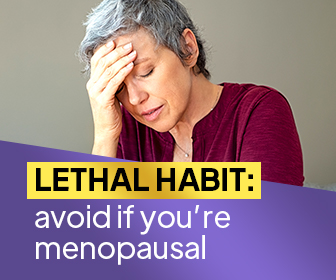Vitamin supplements are all the rage these days. But many of us have gotten caught up in the hype, grabbing all the supplements we can to be the healthiest versions of ourselves. But did you know that not all vitamin supplements are beneficial? Did you even know that taking certain vitamin supplements can actually do your body harm?
It’s true that pretty much all of us could use a nutritional boost. While the idea behind vitamin supplements is good, the practice isn’t always what it’s cut out to be. Some vitamin supplements are better than others, of course. Keep reading to find out which vitamin supplements are the biggest waste of money.
Beta-Carotene & Vitamin A
Beta-carotene is a kind of carotenoid that we need in our bodies. It’s actually a type of pigment, which is why you can find it mostly in fruits or vegetables that are yellow or orange in color. Your body converts beta-carotene into vitamin A, which is an antioxidant that helps keep your brain, skin, and eyes healthy.
It’s no secret that foods that naturally contain beta-carotene are good for you. Eating them helps prevent diseases and keeps you healthy in general. People started getting really excited about beta-carotene in part because of its supposed prevention of lung cancer. This is because of data that showed eating fruits and vegetables that have high carotenoid levels actually reduces the risk of lung cancer.
One study was done of 27,084 middle-aged Finnish men between the years 1958 and 1993 (all between the ages of 50 and 69), all of whom were smokers. 1,644 of study participants developed lung cancer within the 14-year range of the study, and the associations between diet (fruits and vegetables with lots of beta-carotene) and the development of lung cancer were analyzed. It was concluded that there may be a correlation between high consumption of these fruits and vegetables and a lower risk of developing lung cancer.[1]
Though the results of this study are promising, there are mixed reviews when it comes to beta-carotene and vitamin A supplements. Another study in 1996 looked at the beta-carotene, carotenoids, and disease prevention. It concluded that, while eating foods rich in carotenoids is beneficial for human health, using supplements in order to prevent heart disease or lung cancer should no longer be recommended, as it has no real benefit.[2]
In fact, some studies even show that there could be negative effects from taking antioxidant supplements — including increasing your risk for the very cancers you’re trying to prevent. One review published in 2009 found that very conclusion after analyzing thousands of articles and trials.[3]
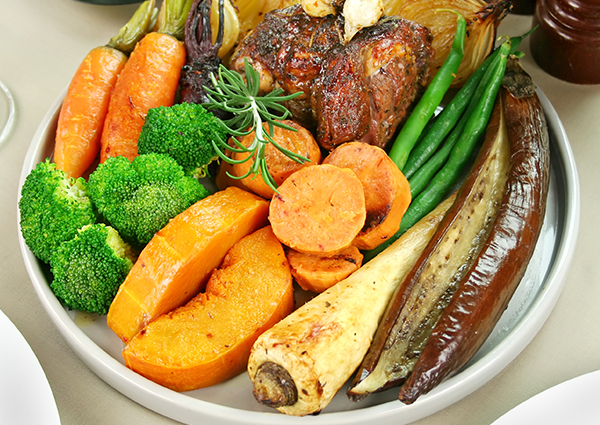
What can you take from this? You should definitely eat more orange and yellow fruits and vegetables, as they will give you a vast number of health benefits. You shouldn’t be wasting your money on supplements, though, as they won’t give you those same benefits.
The following foods have high levels of vitamin A or beta-carotene:
- Carrots
- Sweet potatoes
- Kale
- Spinach
- Apricots
- Broccoli
- Butter
- Eggs
- Winter squash
Fun Fact: Vitamin supplements are readily available, which is part of their appeal. However, the Food and Drug Administration does not need to approve supplements before they go on the market. In other words, they have fewer regulations than other kinds of pills, which could make them more dangerous.
Vitamin C
In the 1970s, vitamin C became well-known as a cure or reducer of symptoms for the common cold. Vitamin C can be taken in the form of supplements (pills), as well as cough drops, tea, juices, and more. Indeed, vitamin C is a highly important nutrient for the workings of our bodies – it helps you keep your strength up in general but also helps keep your blood vessels, muscles, and bones healthy. It also aids in the absorption of iron and the formation of collagen.[4]
Somehow all this translated into people thinking it would help them heal from their colds faster. Since then, it has become almost common knowledge to take vitamin C in the event of a cold. Common wisdom says that this will help lessen the severity and length of time you have a cold but is this so-called wisdom actually based on facts?
In one study done in 2007, researchers set out to answer exactly that. Their study looked at taking a minimum of 200 milligrams of vitamin C on a daily basis, and whether that had any effect on the duration and severity of a cold and its symptoms. It also looked at whether the number of colds a person develops could be reduced by taking vitamin C on a daily basis.
They found that Vitamin C supplementation doesn’t really help that much unless you took it on a daily basis all the time. If this was the case, you might reduce the duration of a cold by a day or so. In fact, placebo was even found to be just as effective as actually taking the supplements themselves.[5]
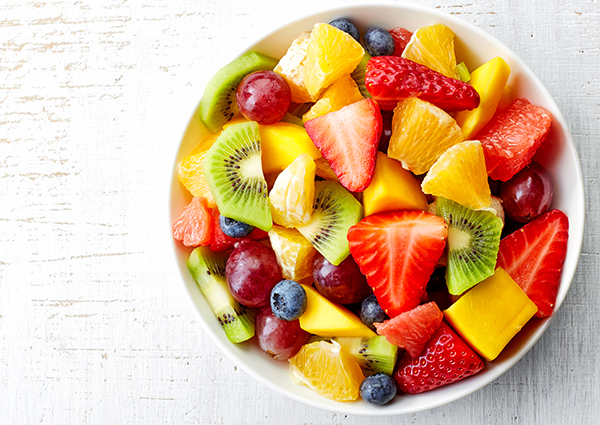
In summary, vitamin C supplements won’t help you shorten the amount of time you have a cold, nor will they really help with how frequently you get a cold. Regardless of if you have a cold or not, getting enough vitamin C is important. The following fruits and vegetables are natural sources of vitamin C:
- Citrus fruits (i.e. oranges, grapefruits)
- Mango
- Papaya
- Pineapple
- Cantaloupe
- Kiwi
- Berries (strawberries, raspberries, cranberries, and blueberries)
- Watermelon
- Cauliflower, broccoli, Brussels sprouts
- Bell peppers (green and red in particular)
- Leafy greens (i.e. spinach, cabbage, or turnip greens)
- Tomatoes
- Winter squash
Fun Fact: The word “natural” on a label is not the same thing as “safe.” In fact, supplement manufacturers don’t even have to prove the safety of their product – they simply send their label to the FDA for review (which is not the same thing as FDA approval).
Vitamin E
Vitamin E is another nutrient that is vital for your health and the prevention of various diseases, but that can’t provide the same benefits if it is taken in supplement form. In fact, vitamin E supplementation could actually do you harm instead. One study published in 2014 involved more than three thousand male participants and looked at the effects of vitamin E supplementation (along with selenium supplementation – see “selenium” section below). It concluded, among other things, that men who had low levels of selenium and took vitamin E supplements actually had an increased risk of prostate cancer.[6]
One study published in 2014 concluded that eating foods rich in vitamin E could be an effective way to prevent Alzheimer’s disease from developing. This is especially the case if these foods are eaten alongside some other lifestyle changes, none of which have any detrimental effects. The study stresses that vitamin E needs to come from foods in order to be beneficial. Supplements do not provide the same benefits. You should aim to get around 15 milligrams of vitamin E from foods per day.[7]
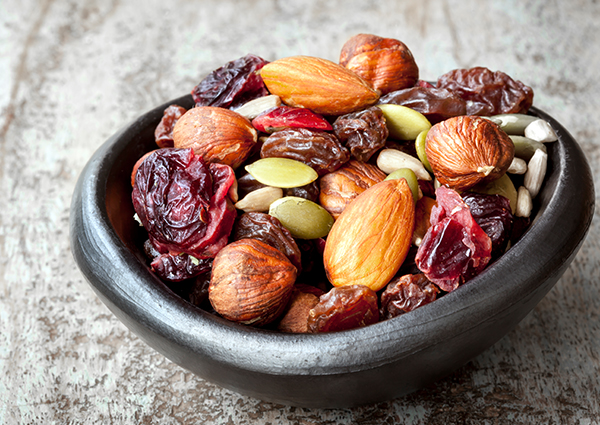
Other studies have also proven the connection between vitamin E from foods and reduced rates of Alzheimer’s disease or dementia. One study, the Chicago Health and Aging Project, was published in 2005.[8] The other study, called the Rotterdam study, was published in 2010.[9]
Foods rich in vitamin E include:[10]
- Almonds (7.3 mg per ounce)
- Spinach (6.9 mg per bunch)
- Chard (3 mg per cup)
- Sweet potatoes (4.3 mg per cup)
- Avocado (2.7 mg each)
- Sunflower seeds (4.2 mg per tablespoon)
- Palm oil (2.2 mg per tablespoon)
- Butternut squash (2 mg per cup)
- Trout (2 mg per 3 ounces)
- Olive oil (2 mg per tablespoon)
Folic Acid
For a while, it was thought that taking additional folic acid (whether as a supplement or having it added to foods) was tied to higher rates in colon cancer, but several studies have now shown that it is likely not the case. One study published in 2015, for example, explains that there were conflicting results, but showed via a meta-analysis that folic acid supplements did not affect colon (or colorectal) cancer. Nonetheless, it did mention that further studies should be done to make sure.[11]
The main thing that folic acid is thought to help is women during pregnancy. While results do conflict, many recent studies tend to show that there is not much in the way of proven benefits when you take folic acid supplements during pregnancy. Specifically, folic acid is said to help prevent certain problems that could occur during pregnancy, including neural tube defects (NTD). It is also supposed to help prevent miscarriages.
Does taking folic acid really help with these things, though, or is that just another wrongful assumption passed down the line? The science is thus far unclear. According to one review published in 2016, supplementation with folic acid had unclear or conflicting results.[12] According to another study published in 2011, however, folic acid supplementation before a woman became pregnant did seem to reduce the risk of congenital heart defects, NTD, and preterm birth. The study involved a double-blind, randomized, placebo-controlled study of 144 women of childbearing age. It nonetheless also acknowledges that more studies need to be done.[13]
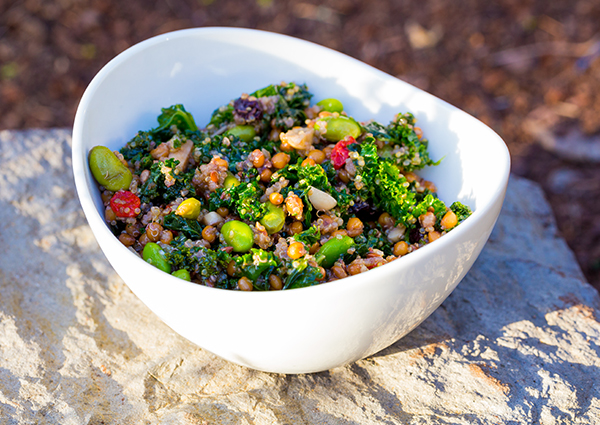
So, while the science is not yet conclusive, we can assume from these studies that taking folic acid supplements may be beneficial before pregnancy. In this case, it is best to follow the advice of your doctor and what he recommends. For the rest of us who are male or are female and not planning on becoming pregnant, it’s best to get our folic acid from foods rather than supplements.
The foods that contain the most folic acid include:
- Leafy greens (i.e. spinach)
- Citrus fruits (i.e. orange juice)
- Beans
- Breads
- Cereals
- Rice
- Pasta
Selenium
Some people take selenium in the hopes that it will prevent cancer. Prostate cancer is, in particular, thought to be warded off by taking selenium. Unfortunately, however, it seems that there’s a chance the opposite could be true. It might be true that taking selenium actually increases the risk of the cancer developing in men – this applies if they already have enough selenium in their bodies.
One study, published in 2014, looked at selenium supplementation and how it affected men who already had enough selenium in their bodies. It used a randomly selected group of 3,117 men and studied selenium supplementation along with vitamin E supplementation (see vitamin E section above). Men who already had high levels of selenium increased their risk of developing high-grade prostate cancer by a whopping 91%! Additionally, men who had low selenium levels did not see any noticeable benefit from taking supplements.[14]
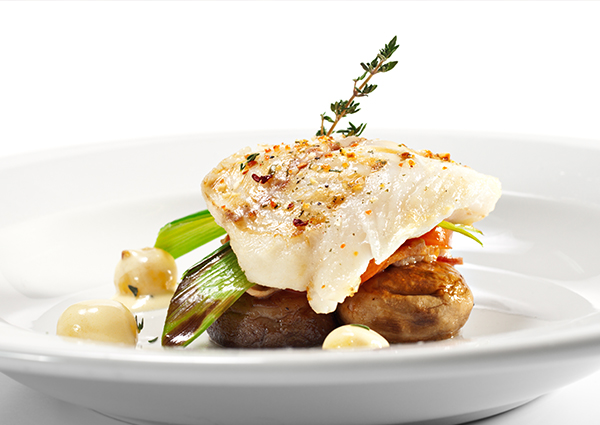
Instead of bothering with the supplements, try eating the following foods to increase your selenium intake:
- Brazil nuts
- Yellowfin tuna
- Cooked halibut
- Canned sardines
- Beef (grass-fed)
- Turkey
- Beef liver
- Chicken
- Eggs
- Spinach
Summary: What Should You Do Now?
While it is certainly possible that many of the supplements out there can be healthy and helpful, it’s important to stay skeptical when you’re reading labels. Don’t take them at face value. Many of these labels claim that the supplement is “natural,” but what could be more natural than getting the nutrients from real food?
Indeed, if you have been taking any of the above supplements, it’s time to toss them and get the nutrients elsewhere. In other words, you should start looking at your eating habits and seeing where you can improve. All of us could use a dietary boost, after all. Keep reading to see how you can get started easily.
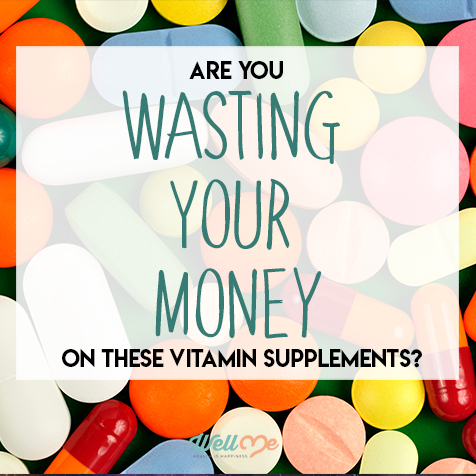
Action Steps: Tips for Getting These Nutrients Naturally
- Eating more leafy greens is a great way to start. Leafy greens (such as spinach, kale, collard greens, Swiss chard, and arugula) have high levels of every nutrient mentioned in this article: vitamin A, vitamin E, vitamin C, folic acid, and selenium.
- Eat more seeds and nuts, especially almonds (vitamin E), Brazil nuts (selenium), and sunflower seeds (vitamin E).
- Go beyond the green and make your diet more (naturally) colorful. Differently colored fruits and vegetables have different nutrients – and the more you diversify your diet, the better! To start, add some yellows, reds, and oranges. This might include butternut squash (vitamin E), carrots (vitamin A), red bell peppers (vitamin C), sweet potatoes (vitamin A & E), and oranges (vitamin C).
While taking a magic pill does sound like the easy way to stay healthy, so far nothing can substitute having a healthy and natural diet. It is always a good thing to know what the various vitamins do for our bodies, so anyone interested in supplements can still gain something from the process. Nevertheless, it is best to research which foods can provide the nutrients in question rather than taking a pill for it. It may not sound easy, but it really can be!
References
- [1] “Dietary carotenoids, serum beta-carotene, and retinol and risk of lung cancer in the alpha-tocopherol, beta-carotene cohort study.” NCBI. <https://www.ncbi.nlm.nih.gov/pubmed/12226001>
- [2] “Beta-carotene, carotenoids, and disease prevention in humans.” NCBI. <https://www.ncbi.nlm.nih.gov/pubmed/8635686>
- [3] “Effects of antioxidant supplements on cancer prevention: meta-analysis of randomized controlled trials.” Oxford Academic. <https://academic.oup.com/annonc/article/21/1/166/145445>
- [4] “Vitamin C for the Common Cold.” WebMD. <https://www.webmd.com/cold-and-flu/cold-guide/vitamin-c-for-common-cold#1-2>
- [5] “Vitamin C May Be Effective Against Common Cold Primarily in Special Populations.” Medscape. <https://www.medscape.org/viewarticle/560249>
- [6] “Baseline Selenium Status and Effects of Selenium and Vitamin E Supplementation on Prostate Cancer Risk.” Journal of the National Cancer Institute. <https://academic.oup.com/jnci/article/106/3/djt456/977656>
- [7] “Dietary and lifestyle guidelines for the prevention of Alzheimer’s disease.” ScienceDirect. <https://www.sciencedirect.com/science/article/pii/S0197458014003480>
- [8] “Relation of the tocopherol forms to incident Alzheimer disease and cognitive change.” Scopus. <https://www.scopus.com/record/display.uri?eid=2-s2.0-14544300607&origin=inward&txGid=de5485f07539d751ec7b8944f609a5c1>
- [9] “Dietary antioxidants and long-term risk of dementia.” Scopus. <https://www.scopus.com/record/display.uri?eid=2-s2.0-77955043040&origin=inward&txGid=fd646210454bd6329dcece7e2fca8fd2>
- [10] “Top 10 Vitamin E Rich Foods.” Dr. Axe. <https://draxe.com/top-10-vitamin-e-rich-foods/>
- [11] “Folic acid supplements and colorectal cancer risk: meta-analysis of randomized controlled trials.” NCBI. <https://www.ncbi.nlm.nih.gov/pmc/articles/PMC4487230/>
- [12] “Folic acid and diseases – supplement it or not?” NCBI. <https://www.ncbi.nlm.nih.gov/pubmed/27008500>
- [13] “Folic Acid Supplementation and Pregnancy: More Than Just Neural Tube Defect Prevention.” NCBI. <https://www.ncbi.nlm.nih.gov/pmc/articles/PMC3218540/>
- [14] “Baseline Selenium Status and Effects of Selenium and Vitamin E Supplementation on Prostate Cancer Risk.” Journal of the National Cancer Institute. <https://academic.oup.com/jnci/article/106/3/djt456/977656>
- Fun Fact Source: “Dietary Supplements: What You Need to Know.” U.S. Food & Drug Administration. 29 November 2017. <https://www.fda.gov/Food/DietarySupplements/UsingDietarySupplements/ucm109760.htm>
- Fun Fact Source: “Supplements: Myths and Truths.” Berkeley Wellness. 17 December 2013. <http://www.berkeleywellness.com/supplements/other-supplements/article/supplements-myths-and-truths>


